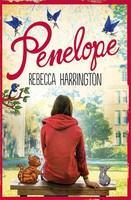First, a brief questionnaire to assess your eligibility for this book:
1. Do you have a wickedly dry and deadpan sense of humour?
2. Do you appreciate gentle, even whimsical satire?
3. Are you fond of British novels from the 1930s?
If the answer to two or more of the above questions is yes, then congratulations, you may proceed to the review!
Because seriously, this is a novel that will only work with the right sense of humor. If you like to take your fiction at face value, if you enjoy melodrama and gutsy emotions, then you will be left bewildered and somewhat out of sorts. If, like me, you have a deep fondness for slightly daft, old-fashioned comedy set in grand educational insitutions, you will love it.

The people around her, however, are not exactly easy to win over. Her room mates are Emma, a rocket-fuelled over-achiever with a starry social life and a medal in emotional manipulation, and Lan, a genius misogenist who only likes her illegally-kept cat, Raymond (Penelope is allergic). Upstairs lives Ted, an eager to please young man with a disconcerting fringe that makes him look (not in a good way) like a Roman centurion. It’s clear that Ted does like Penelope, but that Penelope instinctually senses they are too alike as uncertain misfits ever to risk being a couple. Penelope’s desires all tend towards the enigmatic Gustav, a student whose worldliness and impeccable pedigree impress her as much as his three-piece suits and his complete indifference to his studies. This makes him stand out in a community where exams are the principle topic of conversation: ‘Homework was like a North Star that everything turned to.’
If you’ve ever been to a sightly hysterical institute of learning, and failed to make friends or fit in, then there is much that will be utterly familiar about this novel. Harrington gently pokes fun at the obsessive-compulsive traits of dedicated students and their grandiose ambitions and opinions, whilst at the same time tapping in to the insecurities of teenagers the world over – the flailing about in search of an identity that constitutes socialising at that age. Harvard is mercilessly satirised, with the constant refrain rising from its ranks that here’s where you’ll have ‘the best conversations of your life’, which are of course never in evidence, and its lacklustre traditions, like the Harvard-Yale football game: ‘The crowd was generally old and clad in fur coats. There were current students at the game too, but they seemed to be a constantly fluctuating, less vocal maroon number, like a small, sad, consumptive sister to the robust alumni of yore.’
Not a lot happens. Penelope scrapes through her classes, fails to make lasting friends, gets involved in a hilariously turgid drama production and does not find true love. But it ain’t what she does, it’s the say that she does it. The narrative is littered with wonderful observations, like Penelope’s experience of the ‘feeling in her stomach that occurs when you realize that your time enjoying composure is rapidly coming to a close’, or the description of the football stadium that was ‘a late Victorian replica of the Coliseum that was both imposing and wholly devoid of irony.’ And I would have loved the book for one of the best lines I’ve read in a long time, when Penelope turns an ardent Gustav away from her door: ‘Suddenly Penelope could not remember why exactly she had said good-bye to him at the door. It had something to do with fear, but she hoped it would be mistaken for strategy.’
I thought this was a delight, a charming romp with an ascerbic edge and a taste for the absurd, and if that sounds a bit heterogeneous, well you’re right. Penelope does bring together the old and the new, the funny and the dreadful, the ditzy and the sharp. And if that’s your sense of humour, sit back and enjoy.
And if you enjoyed this book, you might want to consider a couple of other possibilities from Shiny New Books:
The Following Girls by Louise Levene, a brilliant novel set in a girls’ school in the 70s
The Tell-Tale Heart by Jill Dawson, in which a womanising professor is given a beating heart transplant with strange consequences. (I’ll be reviewing this myself in a few days time.)
